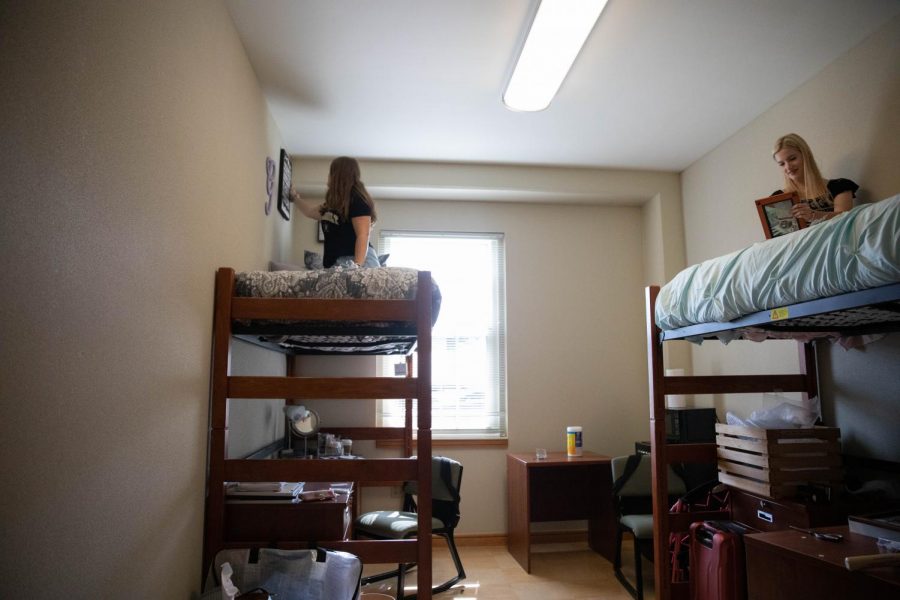Praise about the roommate experience has no bounds. The shows and movies we watch portray having a roommate as an almighty, spiritual bond that can never be broken. However, from personal experience, all it takes is one bad roommate to destabilize the foundations you try to form.
As a first-year student from the United Kingdom, the university experience varies drastically from home. Students in the UK expect to live in a communal space, similar to my own experience, but are also guaranteed the privacy of their own room. Consequently, having a direct roommate who lives in close proximity to me is foreign. With few expectations as an outsider, I was excited to find a roommate with whom I could bond, and I quickly gathered that there were two routes: “going random” or choosing your roommate via social media.
The first option seems like the simple, easy way out of choosing a roommate. The housing survey that Vanderbilt offers to all of its students alleviates the pressure of having to find a roommate online, doing the heavy lifting of pursuing them and ensuring a living style match. The roommate quiz asks simple questions such as your routine, sleep schedule and living arrangements, but it doesn’t go beyond the surface level and often fails in helping you find a roommate who actually fits well with you as a person. Sharing your space with someone is more than having similar routines. Your room being a comfortable space should be a priority, and that’s not the easiest problem to solve in a lackluster survey.
The second, more popular option is using social media. This choice can be nerve-wracking as most students try to find people similar to themselves, but others may not fit the criteria that they are looking for. The most popular way of finding a roommate online is through the infamous “Vandy Bio” pages on Instagram. These pages allow incoming first-years to post a short biography, which typically includes photos of themselves, their majors, their hobbies and more — adding a casual feel, grounded in the comfortability of social media common in our generation.
While being able to reach out to practically anyone as a roommate seems like an increase in accessibility and control, purely basing your expectations off someone’s Instagram feed is a trap. Making a decision about who you will live with for a full year based on how potential matches present themselves online will not result in healthy expectations for living with that person. Students may hold their roommates to that perfectly curated post that isn’t representative of all aspects of a person.
To add on to the process of choosing a roommate, there is also the impending arrival on campus and meeting your roommate for the first time. Students often have many expectations for their future roommates, and the early weeks provide hope that they may fulfill them until they don’t. The facade shatters when the way they live is different than they described, the options that they clicked on the roommate quiz don’t match their actions and how they act toward you makes you uncomfortable in your own space. From those with whom I have personally interacted who had roommate problems, complaints lie with uncleanliness, poor personal hygiene, borrowing without asking and personal ideological conflicts. And, while getting a bad roommate can be disappointing and painful for students, there is generally no way to avoid it.
If a student determines that their room is not a safe space for them, the next step is to report it to your Resident Advisor. RAs are students themselves and may sympathize or empathize with your situation, but their position ultimately must remain neutral. This neutrality hinders the process of effective problem solving with your roommate and can be painful for both parties. The roommate mediation held through an RA can often fail those in trouble and increase the tension between two people living with each other, making it uncomfortable rather than resolving issues. From my own experience, trying to be open with one another when you struggle to see eye-to-eye eventually resulted in closing off from my roommate and finding comfort elsewhere.
After a semester of living on Commons, it is clear that every dorm building is filled to capacity. Options of moving out are limited and students lack communication about choices they can pursue in maneuvering around their situation.
The whole roommate process needs a reform. The roommate quiz is too limited in what it asks, and it is easy for students to lie and mislead with the provided questions. Everyone wants a “clean” roommate, but cleanliness is a spectrum that may look different from person to person. Being close with your roommate may seem ideal, but boundaries are not always clear and may ultimately lead to disrespect toward one another. Questions interrogating the ideology of potential roommates for better matches would be a good addition to the roommate quiz. This change would avoid having to deal with a constant clash of beliefs and ideals as well as the potential fear of being in your own space.
Additionally, questions asking a ranking of what levels of cleanliness and hygiene people are comfortable with would head off problems arising from the levels of cleanliness and hygiene with which people were raised, making dorm life more livable for students. It would also match students better than just simply clicking the option that you are clean. I believe that there should be more guidance in choosing your roommates online prior to arriving on campus, as well as further assistance by floor RAs in vocalizing support for those who wish to change roommates and making students aware that it is a viable choice to switch out of an uncomfortable situation.
Overall, potential roommate problems should have a better and faster way to reach resolution that creates empathy for those who feel victimized by their living situation.







